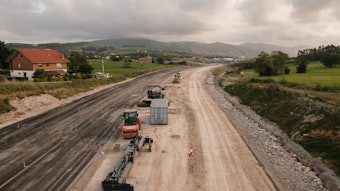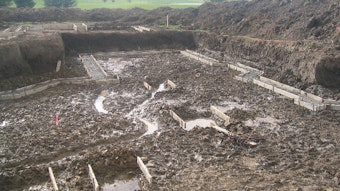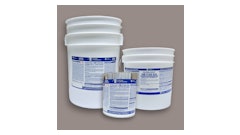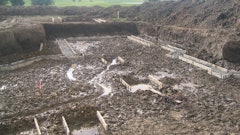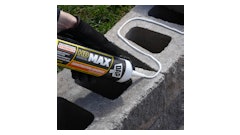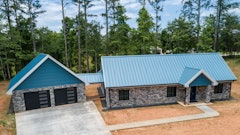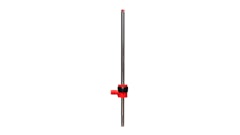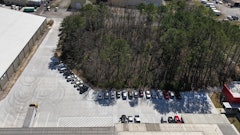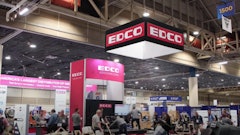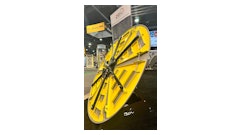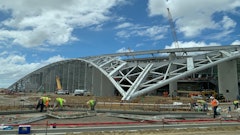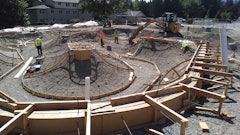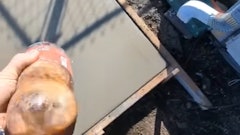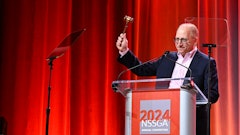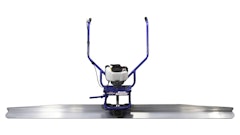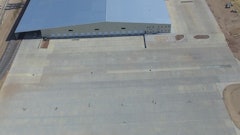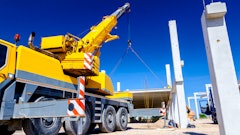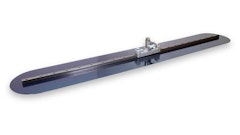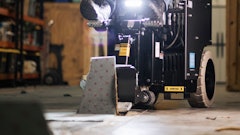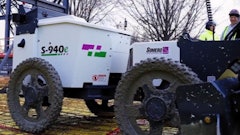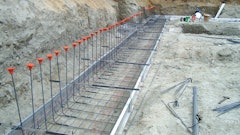
Engelman Construction's broad range of concrete services can look like an overwhelming amount of projects to juggle with training, experience, contract negotiations and marketing efforts, but the family business pulls it off with its organization and years of experience in the industry. And with the current market situation, that diversity has helped the company. "People who specialize can streamline operations," says Jim Engelman, vice president at Engelman Construction. "We can't do that so much, but in a big downturn like the industry is experiencing now it really helps that we're so diverse."
Engelman Construction is a full service concrete contractor located in Macungie, Pa. It serves eastern Pennsylvania and parts of New Jersey, Maryland and southern New York. Today it's run by six Engelman siblings. Their father, the late Al Engelman, started the business in 1974 as a residential concrete company. Over the years, he moved his children into key positions in the company and together the family added services and developed the firm into the full service concrete construction company it is today.
Engelman Construction offers a broad range of concrete services in commercial, residential, public and government applications including tilt-up, decorative concrete, superflat floors, roller compacted concrete and pervious concrete. In 1980, the Engelmans acquired a sister company with Bethlehem Precast, a specialty precast company that takes on small custom jobs for the residential and light commercial industries.
Owning and running a business with six family members might seem like a difficult situation for some people, but at Engelman Construction the family has found a way to work together effectively. For the four brothers and two sisters, the family dynamic works, mostly because they treat the company like any other job.
"Everyone has a job to do,"
Engelman says. "We each have a specific area within the company to oversee. We all found an area we excelled at and fell into that niche."
Joe serves as president and handles estimating and contracts on large jobs. Tom manages the precast facility while Bob handles scheduling, estimating and site work. Jim focuses on the decorative operations, jobsite troubleshooting and association liaison. Kathy manages marketing and health insurance while Mary handles payroll, 401K and other insurance issues. Two brothers-in-law have found rolls as accountant and human resources and safety officer. Mom is there for support in the office when they need it.
"Our father was very family oriented," Engelman says. "His greatest challenge was keeping us on the same page. He made sure we were always going forward together, and that can be hard with six people. He left a footprint of how to run a business, and it's up to us to keep it going and remain proactive and on the cutting edge of the industry."
The brothers spend much of their days on the jobsite. "It's important to keep the Engelman presence in the field, so our employees don't think we're just sitting around in the office collecting money," Engelman says. "We're out there working and letting our employees know we're there supporting them."
The family theme in the business doesn't stop with the siblings. Engelman Construction has company-wide picnics for employees and their families, and organizes outings such as baseball games at the local Iron Pigs field where the company did some concrete work.
Dealing with today's market
Engelman Construction works in and around Allentown, Pa., an area of northeast Pennsylvania that saw a unique twist during the housing boom. It's only an hour's commute into New York City, which increased the area's demand for high-end homes. Residential business was booming for several years, along with a strong commercial market. The area saw its first decline in the residential market when the national housing situation took a downturn, and a deeper decline when gas prices rose, making the area less desirable to people commuting into New York City.
These factors led to a decline in job activity for Engelman Construction, with sales dropping from $12 million annually to an expected $8 million in 2008. The company has been working with smaller employee rolls and focusing on efficiency to keep the company profitable. For instance, Engelman says the company has cut back its spending where it can, putting a "moratorium" on equipment purchases unless absolutely necessary and focusing more on maintenance. "We have a great maintenance program with three in-house mechanics, so where Company X gets two years out of a piece of equipment, we might get five or six years out of it," Engelman explains.
But that's not the whole story. The flexibility the company has with its diverse mix of services along with the precast company has allowed the Engelmans to shift their focus toward serving the stronger construction markets, such as precast. This year the Engelmans expect the precast company to bring in at least $3 million more in sales over previous years. They've moved many key employees from Engelman Construction to Bethleham Precast to keep them employed with the organization.
Engelman Construction is still seeing work across other parts of its business and has adjusted to market demands. In recent years the tilt-up market has flourished because of a boom in distribution centers in the area. While that business has declined, Engelman
Construction has kept crews busy by going after demolition and retrofitting work at existing distribution centers, adding additions and redoing floors. Engelman's crews are also busy doing site work, especially at schools, and Engelman says the residential decorative market remains very strong. "Homeowners are not going on vacation but upgrading their backyards with new decorative patios and pools," he says.
Keeping up with trends
Engelman Construction has always had a strong presence in the industry. Al Engelman was deeply involved with many concrete associations, and Jim has taken over that role for the company. "We're very industry and association oriented," Engelman says. "Being involved with associations has helped our business because we know where the market is heading."
Its involvement in the industry has tipped them off to new products and techniques over the company's history. Engelman Construction began performing decorative concrete in the late 1970s, and it introduced tilt-up construction to eastern Pennsylvania in the 1990s. Today the company is a prominent residential decorative contractor in the area, and the company performs about 50 percent of the tilt-up work in its market.
A more recent trend the company has embraced is pervious concrete. The Engelmans started experimenting with the system five years ago. "It's been a slow haul, getting it through to architects and engineers," Engelman explains. "We've had to educate them on the differences between what they think the system does and what it can actually do."
Engelman has been working with his ready mix suppliers to perfect mix designs and has laid test patterns for interested parties. The company is currently involved in a side-by-side comparison with pervious asphalt at a parking lot at Villanova University.
Engelman jokes that he's finally getting paid for some of his pervious work after five years of educating the area about the system. The education has paid off though, and he sees a lot of promise for pervious concrete. "Towns are starting to limit the amount of impervious structures on a property when you apply for a housing permit. You've got a lot of small lots, and with a big house and a pool there's very little land left," Engelman says. "We think driveways are a perfect application for pervious in these situations. And when we market that angle we can also go after a patio, a pool deck or other decorative work at the house."
Engelman also see pervious tied closely with sustainable building projects in the commercial and public markets. They've stayed informed on other issues in the "green" building market, working with fly ash and slag mixes. "We haven't started marketing a 'green' side to the company yet, but we see that trend coming. When we're bidding a project where we know someone is looking at sustainability initiatives, we let them know what we offer in that arena," Engelman explains.
Professionalism, experience and industry involvement has kept Engelman Construction on the leading edge of the concrete industry. With 50 percent of the company's business from repeat customers, its success shows. And in continuing with the company's philosophy on diversification, they strive to expand their company through niche services to market to new customers every year.
Bethlehem Precast
In 1980, the Engelmans purchased Bethlehem Precast, a residential and commercial precast facility 15 miles from Engelman Construction headquarters. The facility, which is certified through the National Precast Concrete Association (NPCA), produces roughly 120 yards of concrete a day and does its rebar work in-house. A recent downturn in business at Engelman Construction has coincided with a surge in business for the precast facility, resulting in Bethlehem Precast hiring some of Engelman Construction's key employees.
Bethlehem Precast is geared toward custom jobs, with the company often taking on small runs that large precast facilities don't want or aren't set up to handle profitably. Jobs come in from general contractors, erection companies and large precasters. Some of Bethlehem Precast's more popular residential offerings include entrance stairways, egress window systems, bench ends, retaining walls and flower planters. "We are set up to do custom work," explains Tom Engelman, president of Bethlehem Precast. "Some other precasters have seen what we've done and copied us, but that's why we always want to stay on the cutting edge and out ahead of the competition."
In recent years, Bethlehem Precast has found a few niche products that have helped expand its market and increase sales. The company has gotten into cable concrete, used as erosion control mats; light pole bases that save an electrical contractor 20 to 40 percent over alternative methods; and stair and landing systems for stadiums and auditoriums. Another recent innovation at Bethlehem Precast has helped high-rise builders gain efficiency and safety on the worksite by using precast stairs over cast-in-place concrete stairs. "As they're working up a building, the stairs are placed in so they don't have to worry about steel pans or ladders. This eliminates a lot of safety problems," Engelman explains. - RW
